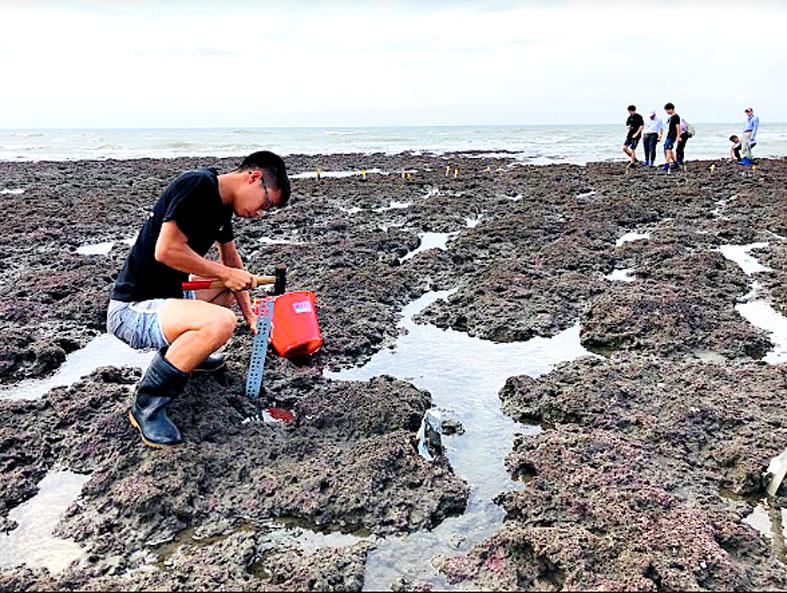The ecosystem of the Datan algal reef in Taoyuan would face “a complete breakdown” if a natural gas plant is built in the area, researchers said on Tuesday.
Wen Guo-zhang (溫國彰), a professor in Tunghai University’s Department of Life Science, said research shows that the G2 and Yongan (永安) sites have the most biodiversity on the reef.
However, comparisons with a 2013 study show that biodiversity and populations in the areas have decreased, with the most likely cause being development of the coastal area in Guanyin District (觀音) in Taoyuan’s Datan Borough (大潭), Wen said.

Photo provided by Wen Guo-zhang
Immediate conservation efforts are needed to protect the reef, he said.
Academia Sinica Biodiversity Research Center assistant researcher Lin Chien-hsiang (林千翔) said that the research found more than 100 otoliths — ear bones that help fish orientate themselves and maintain their balance — near the reef.
This was the first time otoliths have been found in such a sedimentary environment, Lin said.
The number of otoliths found at the G2 site is an indication that the area is home to the most diverse number of fish, he said.
Department of Life Science professor Lin Hui-zhen (林惠真) said that the coastal habitats — including algal reefs, sand, mud, tributary outlets and coastal forests — are home to at least 52 crab species, of which 17 are found near algal reefs.
However, planned construction of a receiving station for CPC Corp, Taiwan’s third liquefied natural gas terminal would change underwater currents, which would affect habitats, possibly causing marine creatures to move or disappear altogether, she said.
Liu Shao-lun (劉少倫), a professor at Tunghai University’s Center for Tropical Ecology and Biodiversity, said that their results show that the reef is an important ecological habitat for the Taoyuan coastal fishery industry.
The reef might also be a midway point for schools of fish moving from Penghu to the northeastern coast of Taiwan proper, Liu said.
A planned 3km to 4km dike to protect the station would be eroded by waves and lead to sedimentary deposits that would affect the area within 9km, he said.
“If the receiving station is completed, the algal reef ecosystem will face a complete breakdown,” Liu said.
Biodiversity Research Center assistant researcher Lin Tzu-hao (林子皓) said that construction of the facility would shatter the perfection of the ecological system and greatly disturb marine animal activity, prolonging recovery of the algal reef.
As low-frequency noises travel a long way in water, it is possible that the area would be affected during the construction process, Lin Tzu-hao said.
Their results are to be published in the Aquatic Conservation: Marine and Freshwater Ecosystems journal, the researchers said.

The Grand Hotel Taipei on Saturday confirmed that its information system had been illegally accessed and expressed its deepest apologies for the concern it has caused its customers, adding that the issue is being investigated by the Ministry of Justice Investigation Bureau. The hotel said that on Tuesday last week, it had discovered an external illegal intrusion into its information system. An initial digital forensic investigation confirmed that parts of the system had been accessed, it said, adding that the possibility that some customer data were stolen and leaked could not be ruled out. The actual scope and content of the affected data

‘LIKE-MINDED PARTNER’: Tako van Popta said it would be inappropriate to delay signing the deal with Taiwan because of China, adding he would promote the issue Canadian senators have stressed Taiwan’s importance for international trade and expressed enthusiasm for ensuring the Taiwan-Canada trade cooperation framework agreement is implemented this year. Representative to Canada Harry Tseng (曾厚仁) in an interview with the Central News Agency (CNA) said he was increasingly uneasy about Ottawa’s delays in signing the agreement, especially as Ottawa has warmed toward Beijing. There are “no negotiations left. Not only [is it] initialed, we have three versions of the text ready: English, French and Mandarin,” Tseng said. “That tells you how close we are to the final signature.” Tseng said that he hoped Canadian Prime Minister Mark Carney

POSITIVE DEVELOPMENT: Japan and the US are expected to hold in-depth discussions on Taiwan-related issues during the meeting next month, Japanese sources said The holding of a Japan-US leaders’ meeting ahead of US President Donald Trump’s visit to China is positive news for Taiwan, former Japan-Taiwan Exchange Association representative Hiroyasu Izumi said yesterday. After the Liberal Democratic Party’s landslide victory in Japan’s House of Representatives election, Japanese Prime Minister Sanae Takaichi is scheduled to visit the US next month, where she is to meet with Trump ahead of the US president’s planned visit to China from March 31 to April 2 for a meeting with Chinese President Xi Jinping (習近平). Japan and the US are expected to hold in-depth discussions on Taiwan-related issues during the

President William Lai (賴清德) yesterday bestowed one of Taiwan’s highest honors on Saint Vincent and the Grenadines (SVG) Ambassador Andrea Clare Bowman in recognition of her contributions to bilateral ties. “By conferring the Order of Brilliant Star with Grand Cordon on Ambassador Bowman today, I want to sincerely thank her, on behalf of the Taiwanese people, for her outstanding contribution to deepening diplomatic ties between Taiwan and SVG,” Lai said at a ceremony held at the Presidential Office in Taipei. He noted that Bowman became SVG’s first ambassador to Taiwan in 2019 and